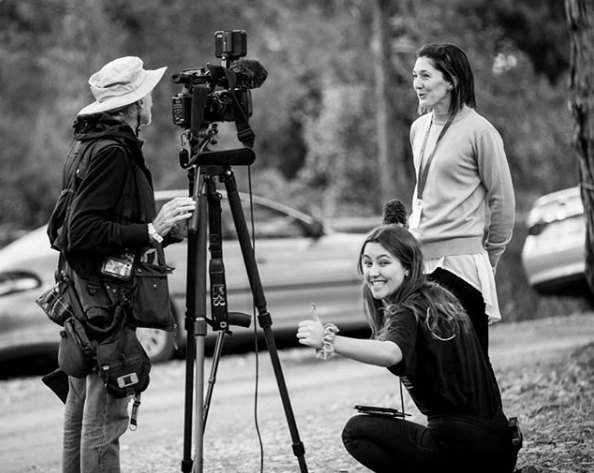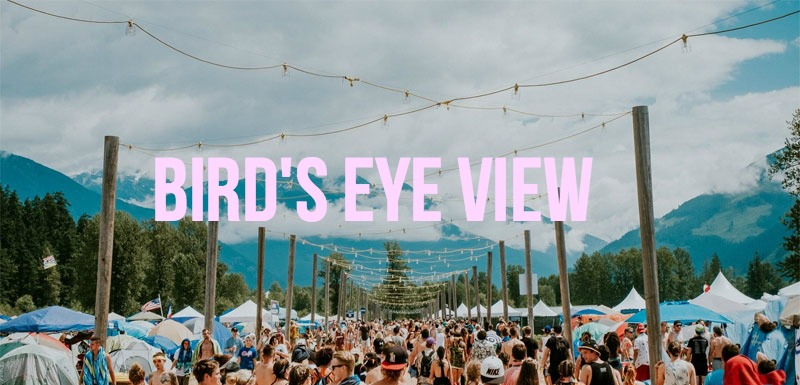Project Description
Interview with
Publicist: LARA JONES
(Sue Mac Media)
Interviewer: Jemma Bird
.

.
In the past, AMNplify has spoken to an array of incredible artists that bring us our favourite music, play our favourite shows and headline our favourite festivals. All of this wouldn’t be possible without the copious amounts of work that goes on behind the scenes.
Amnplify Interviewer Jemma Bird had the chance to speak to some of the hardest working individuals we know and gain a BIRD’S EYE VIEW of what their role in the industry is really like.
Lara Jones is one of our youngest insiders we’ve spoken to yet! At just 20 years of age, her passion for music and incredible work ethic has landed her the job of her dreams. Her role as a publicist for Sue Mac Media includes anything from organizing press releases and artist interviews to directing the media center at the Gympie Muster Music Festival. Check out our chat with the lovely Lara below!
.
.
What made you pursue a career in publicity?
Being a music fan has always been a huge part of my identity, since I was really young… It was always my main interest and hobby. So working in the music industry (in whatever way I could) just seemed like a natural progression from that.
.
How did you come to work at Sue Mac Media?
It was a really weird turn of luck – right as I finished high school I was tutoring a girl whose parents worked in the music industry, and I mentioned to them that that was what I’d always dreamed of doing. They put me on to Sue who was looking for an assistant, and I started working for her right out of school, which is pretty unheard of. She has worked in the industry her whole life – at Mushroom Records back in the day, and now with her own business. So she has seemingly endless experience and has been an amazing person to start out with and learn the ropes.
.
As a publicist, what does your job actually entail?
Basically, we have a client, which for us is usually a music festival, and our job is to facilitate a mutually beneficial relationship between that client and the media… We provide the media content, such as an artist to interview, ideas for a feature article, or just information about the festival, and they provide us with publicity by sharing the event with their audience. As such, we work a lot with artists, traditional media like radio and newspapers, as well as online outlets. We spend a lot of time chatting to clients about possible stories they might have, media they’d love to reach, and their goals for publicity (such as getting a more national reach, or finding the ears of a younger demographic). We’re also responsible for writing and distributing press releases for the clients, announcing line-ups and other important info, to our national database of media.
.
Has this evolved much since you first started working as a publicist?
This has actually evolved a lot in just my three years of working! Many people believe that traditional media is on the way out, and from that I sometimes find people less receptive to what I’m trying to make happen. For example, magazines are far less likely to share our event without advertising spend, as they are just focused on trying to keep themselves afloat as online media takes over… So that relationship can have a bit of tension at times, which I understand. Calling people is also really going out of fashion, which I find hard because I often don’t get replies to emails…And a lot of the time it’s easier for me to wax lyrical about our client by speaking on the phone, rather than through the dryness of an email. But we’re always learning and adapting to that stuff.
.
How do publicists come to work with artists? Through the record label? Management? The artists themselves?
I come across all three of these really often – it depends on the artist! As most of our publicity is done with festivals, the festival usually connects us to either the artist or their manager so we can make interviews happen, and talk to them about the stories they might have to tell. I love when I get to work with an artist themselves, because then we can build a relationship and everyone’s open to helping each other out. Sometimes when the bureaucracy of labels and multiple managers comes into it, it gets difficult.
.
How important is it to find the right publicist? Do all publicists pretty much do the same thing or specialize in areas of expertise?
It’s super important – I know of publicists who are crossing over into social media marketing and more of a new-age approach… Whereas we are starting to do more online media now, but mostly focus on traditional outlets like radio. I would say it’s important to talk to publicists about their approach and see whether it’s going to work for your style of music and your promotion goals.
.
.
Working in the music industry is not your typical 9-5 job. How do you go about balancing your career and personal life?
It can get really crazy sometimes! I’m often responsible for calling international artists at odd hours, and keeping track of time zones… If we’re locking in a media opportunity that is time sensitive, I always have to keep one eye on my emails. Sometimes someone will spot a typo in a media release at the very last second so I get woken up and have to be changing things at midnight. I have to work with two phones, because some of our festivals are up in regional Queensland and only get coverage with a certain company, so that can be overwhelming too. I think the balance comes from the fact that I genuinely love my job. I’m just excited to be working in the industry I’ve always wanted to work in, so if it bleeds into my personal life, it just makes me excited!
.
What has been your biggest career highlight so far?
Running the media centre at the Gympie Music Muster was a great achievement for me. My boss gave me the responsibility of representing her and our entire publicity strategy on ground at the festival, which was an amazing experience. It was crazy exhausting, running around from 6am until past midnight for four days in a row, chasing artists, taking TV crews around, organizing interviews…But it was so worthwhile. And they asked me back to do it all again this year, so I must have done something right!
.
What has been your biggest career blunder and how did you deal with/overcome that?
I feel like I’m always making mistakes, haha! Once I was meant to schedule a press release to go out at 9am the next day, and I accidentally sent it out immediately (which was at about 3pm – not an ideal time to send out a presser!). I got in big trouble for that one. I’ve also sent numerous emails to the wrong media contact, calling people the wrong names, not knowing that they’ve changed media outlet or role… The list goes on. It can be embarrassing but over time you start to realise that everyone does it; you just have to apologise and move on.
.
What’s something that people would be surprised to know about your job?
It involves about ten times more rejection than success. About 60% of the pitches we send out are rejected by the media, because it’s not something they’re interested in, or their show/magazine is full, or they’re not available at that time, or they just don’t reply…The list goes on. A lot of working in publicity is being persistent, and bouncing back from rejection.
.
What advice would you give to someone who wanted your gig?
Be prepared to start at the bottom – for the first eight months in my job I was doing solely admin, excel spreadsheets, creating and formatting word documents, creating reports, etc. It was only after this that I started to get the responsibility of talking to media and artists, and it took another year to be creating my own pitches and developing my own media relationships. Aside from that, my biggest advice for working in publicity is to be creative and personal with your pitches. Media get inundated with emails and calls all day every day asking them to write this or that story and interview this or that person, so there’s no point sending out the same generic pitch to everyone. Different outlets have different formats, audiences and vibes… You’ll get a lot more success if you take this into account and don’t just send out a lazy, cookie-cutter idea to everyone.
.
What’s your favourite part about the job?
Definitely being on-ground. We work on the festivals for 8-12 months leading up to the actual event, and seeing all your hard work come together at the actual event is just so awesome. That’s also where I get the most contact with our artists and our clients, and get to build genuine relationships with them that aren’t just over phone or email. I love that part the most. Aside from that, every time I get something locked in with a media outlet I have a little celebration – getting a yes from someone in a sea of no’s is so satisfying.
.
Photo: @laraajones on Instagram.
.
10 Questions with Lara Jones
.
What is your favourite swear word?
Ooooh. Fuck.
.
What was the last musical thing you did or created?
Listening to songs from an artist that I had to pitch yesterday.
.
What was the last thing that made you feel “uber” proud?
When I was leading the media centre for the Gympie Muster and I was the boss, quote unquote. We’d been working on the campaign for about a year and when people who I had been working with for all this time found out how old I was they were shocked. When people are surprised about my age, that makes me pretty proud.
.
What was the last thing that you really regretted?
Oh god. I just sent an email with a mad typo. I was pitching to a radio station and I said readers instead of listeners. That was pretty bad because it was quite obvious that I had copy and pasted the pitch from an email to a million other outlets and that never looks good.
.
What period of your life would you like to relive?
Ooooh. Probably the first time I went on tour. It was The 1975 tour. It was my first time that I had really been a part of something and travelling to all different cities. I just had a really good experience with the band and meeting so many new people. Touring is kind of getting old because I do it so much and travel so much for work. So I would love to relive that.
.
What period would you not like to relive?
Hmmm. Probably the most recent tour I did, for Harry Styles. He’s obviously a very busy guy, and I really do love him but there was a few people that tried to interact with him and he was just not interested. Maybe he was just super tired from touring and having a bad day. But I wouldn’t like to relive that tour.
.
What is one subject you think people take too seriously?
THEMSELVES. I’ve experienced that with emails and phone calls lately that I everyone thinks you have an ulterior motive and maybe I am just genuinely trying to get the answer that I am asking. There’s no need to be rude.
.
What quote do you find yourself always going to most?
It’s not necessarily a quote, but something that my psychologist has said to me is “Just because someone isn’t interested in you, doesn’t mean your not interesting”. I think that’s something that everyone, including myself needs to remember.
.
What is the one thing you would take a bullet for?
My first thought is my baby sister but something I am really passionate about and want to protect in a sense is young girls being a fan of things. I would take a bullet for the concept of the fan girl and how important and overlooked they are by the music industry. They make artists what they are. So I would take a bullet for the fan girls of the world.
.
What makes you cry and why?
Music is a big part of my life and when I look back at old videos of musicians that I’ve been obsessed with for ages. You know when you go through your teenage years and there’s that one song or one band that you thought got you through so much? Or however the power of music can help you in that sense. I always cry listening back to those songs, no matter how illogical it may seem now that I am a bit older. Like maybe that Justin Bieber song did help me through that hard time when I was 16.
.
If your life was to follow the plot of any movie, which movie would you choose?
Almost famous! I love Penny Lane, I want to be Penny Lane – except maybe a little more professional. What a life to live.
.
.










